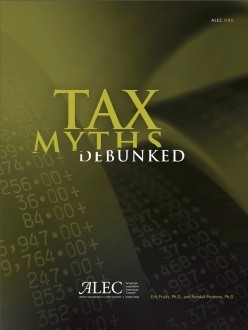The U.S. economy is suffering its deepest and most prolonged recession since the Great Depression. The fundamental causes of the recession and the slow recovery are two decades of poorly conceived housing credit policies and the adoption of failed Keynesian economic policies, say economists Eric Fruits and Randall Pozdena, who add prescriptions for higher taxes on the wealthy, and other “progressive” nostrums, will do nothing to improve the situation.
They are the authors of the newly released Tax Myths Debunked, published by the American Legislative Exchange Council. Their report exposes what the authors describe as seven “myths” commonly used by advocates of higher taxes and other economically harmful policies. Using both theoretical and empirical evidence, Tax Myths Debunked confirms the key to economic prosperity at the state level is in free-market, pro-growth tax and fiscal policy.
Fruits and Pozdena contend government’s credit, housing, and other market-manipulating policies have failed to rejuvenate the economy and have left behind a massive accumulation of national debt. This accumulation has significantly constrained the policy options of the Federal Reserve, Congress and state and local governments, they maintain.
States Must Because Feds Won’t
They write state governments must adopt policies that will support economic growth and “break with the long tradition of high levels of taxation, government spending and intervention at the state level. The states must do this alone because the federal government will be in no position to provide financial assistance.”
“The economy is so complex, almost any intervention comes with greater costs than benefits,” said Pozdena in a telephone interview. He is president of QuantEcon Inc., an Oregon-based consultancy, and formerly served as a vice president of the San Francisco Federal Reserve Bank.
He said government actions “have made matters worse. The recovery of the economy has been far slower than even the president’s own Keynesian-oriented economists have predicted.”
Fruits objected to calls from “progressive” politicians for higher taxes on wealthy individuals, and noted states with no personal or corporate income tax have “a 1.5 percent per annum growth rate advantage over states with income tax” even though they often have higher sales taxes.
‘Positive, Persistent Advantage’
“States without an income tax have a positive advantage and one that is persistent through recessions,” said Fruits, president of Economics International Corp., an Oregon-based consulting firm specializing in economics, finance and statistics. He is also an adjunct professor at Portland State University and Pacific Northwest College of Art.
He noted in California, where the state has repeatedly raised taxes on high-income earners, “36 percent more of the highest-income tax households leave California compared to those who move in.” Wealthy people can move their money and themselves to where they pay less tax.
The Myths
Myth 1: The belief that more government spending can pull a nation out of recession. “It is a myth that was debunked by many studies in the 1970s and 1980s but one that has enjoyed resurgence in this century. We point out theoretical and empirical data show the opposite,” Pozdena said.
Myth 2: Lower tax rates are bad for an economy in a recession, because lower tax revenue forces states and local governments to cut spending. Fruits and Pozdena argue revenues decline because a slow economy shrinks the tax base. Lower tax rates put more money into an economy and can improve growth, which in turn expands the tax base.
Myth 3: Raising tax rates will not harm growth. High-tax advocates cite high tax rates decades ago, when growth was strong. But there is a big difference between marginal rates and real rates. Virtually no one paid the highest tax rates because there were many legal ways to avoid them. “The evidence is unambiguous that higher effective rates do depress incomes and output,” Pozdena said. “I’ve studied interstate migration thoroughly and have found there tends be outmigration to states with less aggressive tax policy.”
Myth 4: Austerity in the form of government spending cuts harms growth and employment. Austerity critics cite failures in Europe, but Pozdena and Fruits note “austerity” there is mostly high-tax programs. “Only one or two European states are cutting government and returning resources to the private sector,” Pozdena said. “Data are being used highly selectively by those who don’t understand the underlying economics.”
Myth 5: Real household income has not grown in the past 20 years. “This [belief] is a dramatic error of measurement,” said Pozdena, noting many households receive non-cash compensation in the form of retirement and insurance benefits, company automobiles, etc. In addition, typical household composition has changed, with smaller families and many more one-person households. “Real household income consistently defined has grown 1.5 percent in real terms per year,” Pozdena said.
Myth 6: Distribution of income is becoming more inequitable. “This is not occurring as they say,” Pozdena said. “They’re looking at different individuals at different times in their life cycles, and there is as much upward as downward movement.”
Myth 7: Raising taxes on the “rich” will not harm the economy. “The notion that we can tax those who are producing the greatest amount of cash flow is beyond the pale,” Pozdena said. “The U.S. tax system is already too progressive in that the share of tax revenues by the highest-income cohorts is far out of proportion to the income they receive.”
Internet Info
Tax Myths Debunked, Eric Fruits and Randall Pozdena, American Legislative Exchange Council: http://heartland.org/policy-documents/tax-myths-debunked





